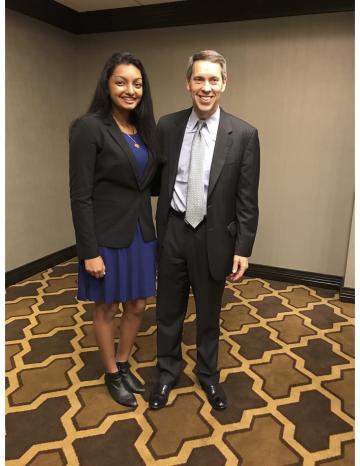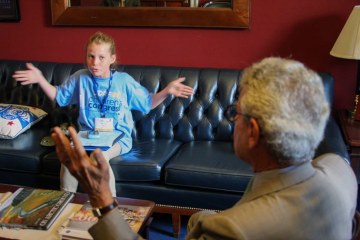Highlights from Children's Congress 2017
The JDRF’s Children's Congress brought more than 160 delegates – children and teens living with type 1 diabetes – to Washington DC on Monday to prepare to make their case to lawmakers and to learn key leadership skills.
In This Article
Highlights from Day One
Representing every state and several countries (UK, Australia, Canada, Denmark, and some others!), the 160 delegates present are specifically advocating for the renewal of the Special Diabetes Program (SDP), which currently provides $150 million annually for T1D research at the NIH. That funding, along with $150 million in funding for the Special Diabetes Program for Indians (SDPI) is scheduled to end on September 30, so the JDRF’s Children’s Congress – focusing on stories of medical need, courage, and resilience – is critical.
Lots of stories about how extensively new technology has helped patients were paramount – and young delegates impressed upon lawmakers how important this was to continue. A number of the volunteers also discussed the enormous success seen by the Indian Health Service and what an economic difference this has made in 35 states across a range of tribes – see this compelling infographic for more on the “sister” SDP program to JDRF’s! What amazing progress to see at both.

The young delegates representing JDRF were joined by parents, caregivers, and many thought leaders with diabetes. Diabetic luminaries included the only female FBI SWAT team agent, Senior VP of Advocacy for JDRF Caroline Marshall; competitive equestrian rider Ms. Morgan Panzirer; former Miss America and public health activist Dr. Nicole Johnson; professional football player Mr. Brandon Denson, and JDRF’s Dr. Aaron Kowalski, who discussed so much progress that SDP has enabled and so much need for more support so that this progress can be built upon and leveraged. He also shared compelling personal stories about the new PEAK program and his experience running over twenty marathons. All of the speakers had words of guidance and inspiration, and they had some attitude as well. A child asked FBI agent Marshall if she ever felt that others saw her as weak because she is female and has diabetes. Ms. Marshall said, “Well, I’m stronger than most of the guys on my team, so that doesn’t really come up.” YES!
The fun continued into the Welcome Dinner, where T1D celebrities and guardians found themselves in a sea of delegates in bright blue JDRF Congress t-shirts. The night began with a wonderful welcome from JDRF government leader Ms. Cynthia Rice, followed by Children’s Congress Chair Angie Platt, whose son, Jonathan, has diabetes, and who spoke so movingly in the hearing. We also heard from JDRF CEO and President Derek Rapp, who talked about Senator Susan Collins (NH), who of course has shown so much leadership in the past several days in Washington! Years ago, Senator Collins shared that she met a 10-year-old boy with type 1, and she was so touched by his story – the boy told her that he just wanted one day off from diabetes (his birthday? Christmas?) – that Collins started the first Diabetes Caucus in the US Senate. What a difference this has made, and how key her work has been with Senator Shaheen from New Hampshire, who spoke so movingly about her granddaughter Elle who is going to college this fall with her dog Coach who senses all her hypoglcyemia.
Rapp discussed how the Children’s Congress delegates played a huge role in advocating for Medicare coverage for CGM. The JDRF’s largest funders for Children’s Congress were also recognized: Lilly Diabetes, Novo Nordisk, Merck, Genentech, and PhRMA. The night concluded with each delegate introducing themselves on stage, and it was heartwarming to see the young 4- and 5-year-olds looking up to the teenagers.
Highlights from Day Two
July 25th marked the second day of the 2017 JDRF Children's Congress. The morning started bright and early with the Corporate Partner Breakfast, where we heard from actor Mr. Austin Basis, JDRF President & CEO, Derek Rapp, JDRF Chief Mission Officer, Dr. Aaron Kowalski, JDRF 2017 Children's Congress Chair, Ms. Angie Platt, and Children's Congress Delegate Ms. Nikhita Gopisetty. Mr. Rapp presented a JDRF update and highlighted the new and growing JDRF T1D Fund, Dr. Kowalski spoke of recent T1D advances, and Ms. Gopisetty ended with a very compelling perspective on JDRF and T1D as a patient. As the speakers did, we thank the organizations who sponsored the Children's Congress event, including Novo Nordisk, Lilly Diabetes, Merck, Genentech, and PhRMA.
The Town Hall followed the Corporate Partner Breakfast, where a panel of Type 1 role models answered the Delegates' questions about living with diabetes in the workforce. The panel consisted of CNN digital correspondent Cristina Alesci, actor Austin Basis, actress Brec Bassinger, NHL hockey player Max Domi, Indy car driver Charlie Kimball, Dr. Aaron Kowalski, actor Paul Sparks, and professional baseball player Cory Vaughn. The Delegates' questions ranged from "Have you ever gone low while on television?" to "Who's the coolest celebrity that you have a selfie with?" The Delegates were excited to see such successful people share familiar feelings and experiences; we were especially moved by Dr. Kowalski’s discussion about his diagnosis, following his brother’s many years earlier, and how the second “sibling” tried to make his family feel better about this troubling time.

During lunch on Tuesday, Children's Congress Delegates and guardians listened to more from Dr. Kowalski who spoke about the progress made in T1D research and how critical the renewal of the Special Diabetes Program (SDP) is. He showed examples of diabetes technology from the past 30 years, and all of the Delegates could see how far we have come in convenience and accuracy so far. Many in the room remembered the early technology (such as it was) and could express how much the JDRF investments had meant in moving along progress. He discussed the difficulty with balancing happiness and health with T1D, which appeared to resonate with many of the Delegates and their families. After giving a thorough description of the SDP and how it funds NIH research to prevent and cure T1D, he called for action: "We cannot accept no here ... It's your money. These are your tax dollars." Dr. Kowalski also talked about our own Ms. Kelly Close and our July 21st Consensus Conference, discussing the importance of CGM and how we must move beyond using A1c as the only metric to assess outcomes for new therapies. He also gave a shout-out to Coco Close who gave a speech earlier in the conference during “Chalk Talks” about diabetes as “a family affair” and the crucial role that siblings often play with other siblings with diabetes or parents.
After lunch came a Delegate Social, where Delegates were given the opportunity to get to know each other and interact with T1D role models. Long lines filled the ballroom as Delegates waited to snap pictures with their favorite celebrities. Many Delegates connected during this event, which contributed to the start of what looked to be many great friendships between and among delegates.
The Blitz Training Sessions ended the day, where Delegates and families trained for the big political ask on Wednesday. The first priority was the renewed of the SDP at the current funding level of $150 million per year. Then, Delegates were to advocate for continued funding of the NIH and FDA and affirm JDRF’s principles amidst health care reform debates on Capitol Hill. Specifically, the principles included:
- People should not be denied coverage or charged high premiums for pre-existing conditions;
- Children should have the ability to stay on parents’ insurance until age 26;
- Essential health benefits should be able to be easily renewed; and
- The donut hole in Medicare Part D should be closed.
Clearly, JDRF gave the Delegates a huge task and huge opportunity – these trainings left the Delegates both excited and nervous in anticipation of their meetings the next day!
Highlights from Day Three
We are so excited to share highlights from the big day of diabetes advocacy on Capitol Hill. In the morning, the 160 delegates and their guardians traveled to Capitol Hill to listen to the testimonies of various diabetes advocates, including actor Paul Sparks, Children’s Congress Delegates Mr. Charlie Albair and Ms. Lorynn Watt, Children’s Congress chair Ms. Angie Platt, and director of the NIDDK Dr. Griffin Rodgers. We encourage you to watch the thoughtful and impactful hearing here.
Senator Susan Collins chaired the hearing – it was a big deal to see Senator Collins throughout so much of the week and representing strong voices from Maine. Though she has not been directly touched by type 1 diabetes, she shared that after she attended the Children’s Congress hearing about ten years ago, she was so moved that she began the first Diabetes Caucus in the Senate! Today, nearly 75% of all Senators belong. As she showed in spades again last week, Senator Collins has been and continues to be a huge advocate for both the Special Diabetes Program (SDP) and the general diabetes community. It was a thrill when Senator Jean Shaheen also joined the leaders and shared the story of 17-year-old Elle Shaheen and her beloved dog Coach, who has saved her many times from severe hypoglycemia. The bionic pancreas was raised along with smart insulin and other technologies in development, and one could sense palpable excitement in the room.
Mr. Sparks, the first testifier, discussed the importance of research in diabetes care, and how new advances allow the patient to have some control over their condition. He described how he uses a CGM device and Afrezza inhaled insulin to help manage his diabetes – he met Dr. Aaron Kowalski and saw a CGM for the first time some years back (when they did a Marathon together) and his words were so compelling about when he first saw a CGM “And I found out I could get one of those. It has saved me.”. He provided a demonstrative - and scary - example of the need for and dependence on research: three years ago, Mr. Sparks turned off his CGM so that his pregnant wife could sleep through the night without any beeping. Because he’d switched it off, it did not alert him when he was becoming hypoglycemic and woke up to a frightened pregnant wife, a crying four-year-old, and seven New York City EMT’s standing over him.
Seventeen-year-old Ms. Watt shared a tear-jerking story of her own life with type 1 diabetes. Her father, who had type 1 diabetes, passed away less than one year after her diagnosis at age nine. He didn’t have access to advanced care or technologies, and a difficult series of complications led to his ultimate passing. Ms. Watt provided a compelling case for the need for more research and access because, as she said, “no one—including all the kids in this room today—should lose their life because of T1D.”

Ten-year-old Mr. Albair furthered these thoughts with his own testimony, where he discussed his developing independence using new technologies. With his friends, he calls the CGM beeps his “natural robot noise.” When he is older, Mr. Albair wants to play for the Boston Red Sox. Though he is able to set high aspirations and embrace his diabetes positively, he still said, “I want my disease to go away—for me and all the other kids who suffer from it. I want us all to be able to live without thinking about it.” And, very coyly, he told the Senators that if they supported the renewal of SDP, he’d invite them all to a game when he is on the Red Sox team! No doubt there was great appeal with the confident young man speaking up!
The brainy and charismatic Children’s Congress chair Ms. Angie Platt spoke about her 14-year-old son Jonathan who lives with T1D. Jonathan has been on the pivotal 670G trial for over a year now and has been able to play basketball incredibly well even with diabetes. In fact, Ms. Platt said so movingly that she actually had forgotten Jonathan even had diabetes with the 670G – but had been reminded by an early coach and mentor, who remarked upon how clearly well Jonathan was doing. Indeed! Jonathan was present for the commentary and helped advocates so much everywhere when he answered some questions spontaneously and movingly about the new technology. He and Ms. Platt called for action and more research in care, complications, and prevention. What powerful speakers they both were!
Expert Dr. Rodgers gave a thorough overview of the new technologies and therapies on the horizon in diabetes care, including the bi-hormonal hybrid closed loop system, islet cell encapsulation, and anti-VEGF drugs to treat diabetic macular edema, a diabetic eye disease. We loved listening to him discuss research, especially on eye disease, where there has been so incredibly much advancement.
Overall, this hearing had a significant impact on the Senators in attendance. After the hearing, all the Delegates split off to meet with their specific state and county representatives. With young children and teens telling their stories to these representatives and advocating for the SDP eloquently and persuasively, JDRF’s Children’s Congress surely made an impression. The SDP has made an incredible difference in advancing diabetes interventions to where they are today and delegates were oh-so-compelling in noting how critical the funds were for current trials, which would end abruptly without the funding and without any results. We hope this impact translates into positive results and 3-year renewal of SDP in September!


